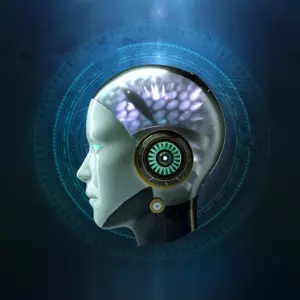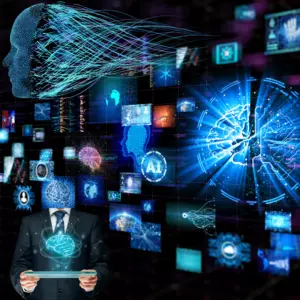
Pioneering Paths
AI in Educational RND
In the ever-evolving landscape of education, the integration of Artificial Intelligence (AI) has ignited a profound revolution in the Research and Development (RND) realm.
This article, “Pioneering Paths: AI in Educational RND,” explores how AI shapes academic exploration’s future. We delve into the diverse facets of AI’s transformative role, from AI-enhanced theoretical research tools and pattern analysis using Machine Learning (ML) to immersive simulations and analytics for gauging research impact.
Join us as we uncover the realms of streamlined documentation, real-time updates, research assistance through AI chatbots, and collaborative research while celebrating remarkable breakthroughs in AI-augmented academia.
As we stand at the brink of new possibilities, we explore the exciting horizons that AI unlocks in the boundless landscape of academic R&D.
Table of Contents

Arindam Roy
An Automation Consultant with 25+ years of IT Experience
Harnessing AI Tools in Academic Exploration
In the dynamic realm of educational research, the utilization of AI tools has emerged as a transformative force, amplifying the capabilities of scholars and scientists. AI aids researchers by automating laborious tasks, enabling more efficient data collection, and accelerating the process of knowledge discovery.
Researchers can swiftly extract insights from vast information repositories through AI-enhanced data mining and natural language processing. Moreover, AI-powered recommendation systems assist scholars in identifying relevant sources, diversifying their perspectives, and refining their research focus.
This synergy between human expertise and AI-driven efficiency paves the way for a new era of academic exploration, where researchers push the boundaries of knowledge with unprecedented speed and precision.
Identifying and Analyzing Research Patterns
In the intricate landscape of educational research, Machine Learning (ML) takes the spotlight by illuminating hidden patterns within vast datasets. ML algorithms meticulously sift through diverse research materials, unveiling intricate relationships, trends, and correlations that might elude human observation.
By discerning these patterns, researchers gain valuable insights into evolving academic landscapes, identifying emerging disciplines and novel research avenues. ML-driven analysis not only streamlines the identification of crucial scholarly trends but also guides institutions in making informed decisions about resource allocation and curriculum development.
As AI continues to refine its prowess, the ability to unravel complex research patterns becomes an indispensable asset in shaping the future of education.
Simulating Experiments with AI
In educational research, AI-driven simulations are revolutionary tools, propelling experimentation beyond physical constraints. These simulations harness AI’s computational power to replicate intricate real-world scenarios, enabling researchers to explore hypotheses in a controlled environment.
This approach accelerates experimentation, reduces costs, and facilitates risk-free exploration of cutting-edge ideas. Through AI-guided simulations, educators and scholars can delve into diverse domains, from physics to social sciences, fostering more profound understanding and innovation.
As AI’s capabilities evolve, these simulations hold the potential to redefine the boundaries of academic inquiry, transforming the way researchers investigate and comprehend complex phenomena.
Gauging Research Impact and Efficacy
In educational research, AI-infused analytics have become indispensable for assessing the influence and effectiveness of scholarly endeavours. AI empowers researchers and institutions to measure the impact of their work across various dimensions, such as citations, media coverage, and societal relevance.
By analyzing intricate data patterns, AI offers insights into the reception and significance of research outcomes. This data-driven approach aids researchers in making informed decisions about their future directions while guiding institutions in optimizing resource allocation for maximum impact.
As AI refines its capabilities, the ability to gauge research impact becomes an essential tool for shaping the future of academia.
Streamlining Research Documentation
In educational research, AI-driven solutions are revolutionizing the process of documenting scholarly work. AI automates tasks such as data entry, citation formatting, and reference organization, allowing researchers to focus on content creation.
Natural Language Processing (NLP) enables the extraction of essential information from research papers, facilitating the creation of comprehensive summaries and annotated bibliographies. Through AI, documentation becomes more accurate, consistent, and efficient, ensuring researchers can dedicate more time to analysis and innovation.
As AI continues to advance, streamlined research documentation promises to elevate the quality and accessibility of academic insights for both scholars and the wider community.
Keeping Abreast of the Latest Research Findings
In the dynamic landscape of educational research, AI is an invaluable ally in staying informed about the latest scholarly developments. AI-driven algorithms scour various academic databases, preprints, and publications, swiftly identifying relevant research findings.
Through personalized recommendations, researchers can access diverse perspectives aligned with their interests. This real-time awareness fosters collaboration and ensures scholars remain at the forefront of evolving knowledge.
Are you passionate about educational research? With the power of AI at your fingertips, you can now access the latest and most relevant insights in your field. Unleash your potential and embrace innovation as you discover cutting-edge information that will enhance the quality of your research.
On-Demand Research Assistance
In educational research, AI-driven chatbots emerge as indispensable companions, offering instant and personalized assistance to researchers. These AI-powered helpers address queries, suggest relevant resources, and guide scholars through complex topics.
Natural Language Processing enables these chatbots to understand the context and deliver accurate responses, saving researchers valuable time and enhancing their productivity. The availability of on-demand research assistance ensures that scholars can overcome hurdles swiftly and efficiently, fostering a more seamless and rewarding research experience.
As AI technologies evolve, these virtual allies are poised to become vital aids in pursuing knowledge.
Collaborative Research in the AI Era
In the landscape of educational research, AI catalyzes a paradigm shift in collaboration, transcending geographical boundaries and disciplinary silos. Collaborative AI tools facilitate real-time sharing of insights, data, and methodologies among researchers globally.
AI-driven platforms streamline communication, enabling scholars to co-create and refine ideas seamlessly. With AI’s assistance, multidisciplinary teams collaborate on complex challenges, leveraging diverse expertise and perspectives. These collaborative ecosystems accelerate knowledge exchange, leading to groundbreaking discoveries that address intricate educational issues.
As AI continues to evolve, collaborative research stands at the forefront of innovation, shaping the landscape of academic R&D into a hub of collective intelligence and transformative ideas.
Celebrating Groundbreaking AI-Driven Educational Research And Development
In educational research, AI emerges as a catalyst for pioneering breakthroughs that reshape the boundaries of knowledge. From uncovering hidden insights in vast datasets to devising innovative teaching methodologies, AI-driven research stands at the vanguard of transformative change.
These advancements lead to enhanced learning experiences, personalized education pathways, and novel approaches to solving educational challenges. By celebrating AI’s role in groundbreaking discoveries, academia acknowledges technological strides and underscores the symbiotic relationship between human ingenuity and AI’s computational prowess.
As we commemorate these milestones, we usher in an era of unprecedented possibilities for education’s evolution.
The Next Frontiers in AI-Augmented Research
In the ever-evolving landscape of educational research, AI stands poised to unlock new horizons that redefine the future of exploration. AI-driven predictive analytics offer insights into emerging research trends, enabling proactive adaptation to evolving academic landscapes.
Advanced AI simulations facilitate intricate experiments that were once inconceivable, pushing the boundaries of scientific inquiry. Collaborative AI networks connect researchers across disciplines, fostering a synergy of ideas that sparks revolutionary breakthroughs.
Integrating augmented and virtual reality promises immersive research experiences as AI’s capabilities evolve. The future of academic R&D with AI holds limitless potential, reshaping how we explore, innovate, and shape the frontiers of knowledge.
Conclusion
The fusion of AI and education propels curriculum development into a realm of innovation, adaptability, and personalized learning. From predictive analytics ensuring success to AI-powered tools aiding educators, the synergy between technology and teaching transforms education.
As we celebrate exemplary AI-driven curricula and envision a future shaped by AI, it’s evident that education’s landscape is evolving. Embracing AI’s insights, educators sculpt curricula that empower students to excel in a world where knowledge and adaptability reign supreme.
Related Articles
- Beyond Books: AI in Shaping Modern Curricula
- Tailored Teachings: AI in Support Need Education
- Smart Schools: AI in Educational Management
- Intelligent Intake: AI in College Admissions
- Never Stop Learning: AI’s Boost in Adult Education
- Digital Desks: AI’s Footprint in Modern Classrooms
- Virtual Varsity: AI in E-Learning Platforms
- Reimagining Rules: AI’s Influence on Education Policy
- Smart Choices: AI in Global Education Counselling
- AI in language learning apps: Chatbots to Culture
- AI-Driven Tutoring Platforms: 24/7 Tutors
- Play to Learn: AI Transforming Educational Games
- Scoring with Systems: AI in Exam Prep
- Tiny Tots, Big Tech: AI’s Role in Preschool Education
- Classroom Companions: AI Tools for K-12 Education
- AI-driven EdTech Solutions: Revolutionizing EdTech Investment and Engagement
- Learning Never Stops: AI’s Impact on Continuous Education
- Skill & Scale: AI in Vocational and Technical Training
- Campus to Computer: AI in Virtual Learning in Higher Education
- Digital Transformation in Education: 5 Areas Where Process Automation Takes the Lead
- Other Articles on AI Usage in Education
- Other Articles on AI usage in other industries























